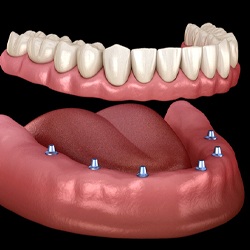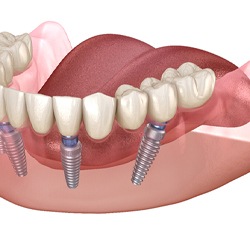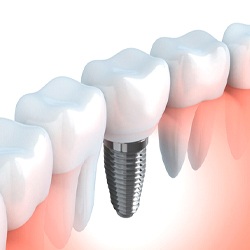Dental Implants – Pearland, TX
Your Permanent Solution to Missing Teeth

Is your life getting a little less enjoyable every day because of your missing teeth? Do they force you to limit your food choices, carefully select your words, or hesitate before smiling? If you’re ready to have a complete set of teeth again, our team at Eco Dental can give it to you using the most advanced tooth replacement methods available today: dental implants. With just one treatment, we can restore your oral health, appearance, and confidence for a lifetime to come, ensuring that the last thing you ever have to worry about are the gaps in your smile. Call us today to learn how dental implants can give you back your complete smile!
Why Choose Eco Dental Pearland for Dental Implants?
- Entire Dental Implant Treatment Completed Under One Roof
- CT Cone Beam Scanner Ensures Precise Results
- Evening & Saturday Dental Appointment Times
What Are Dental Implants?

Rather than sitting on the gums like a regular denture or dental bridge, a dental implant is surgically embedded in the jawbone like the roots of a natural tooth. Made from biocompatible materials like titanium, the dental implant post encourages the jawbone tissue to grow around it until it has essentially become part of your own body. This gives the implant the strength it needs to support a dental crown, bridge, or denture and remain in place for many decades – possibly even a lifetime – to come.
The 4-Step Dental Implant Process

Getting dental implants is not a quick process; the complex nature of this treatment means it can take several months to a year or even longer. However, this method of tooth replacement can last for decades, so we’re sure you’ll find it worth the wait! Better yet, our skilled dentists can perform the surgical aspects of the procedure in-house, so you can avoid the inconvenience of visiting an unfamiliar specialist. The same team you already know and trust will be with you throughout every step of the dental implant process, which includes the initial consultation, the implant placement surgery, the healing phase, and the delivery of your replacement pearly whites.
Benefits of Dental Implants

Dental implants are the gold standard of tooth replacement — and for good reason. The dentists in our practice often recommend them as the best way to replace one tooth, a few teeth, or even an entire mouth full of teeth. Why are implants so popular, and why do they come so highly recommended? Read on below to learn more about the most outstanding benefits of dental implants and why they might be exactly what your smile needs. Then, if you would like to find out how they could help you personally, get in touch with our friendly, experienced team.
Day-to-Day Benefits

According to one 2015 survey, approximately one-third of denture wearers believe that their prosthetic limits their ability to enjoy life to the fullest. Can you relate to them? The benefits of dental implants may be a game-changer.
- The ability to eat most foods – The reason dental implants are so special is because they replace the entire structure of a missing tooth both above and below the gumline. This makes them much more stable compared to traditional bridges and dentures. They are able to stand up to virtually any food.
- A confident smile – Dental implant restorations are carefully designed to complement a patient’s natural facial aesthetics. They are almost identical to natural teeth.
- Speak easily – Normal dentures are prone to slip around in the mouth, especially if they do not fit well. Dental implants are secure enough to enable you to speak clearly and confidently whether you are chatting with friends or having in-depth discussions with clients at work.
- Easy oral hygiene – You won’t have to worry about adopting a complicated oral care routine. Maintaining dental implants is similar in many ways to caring for natural teeth.
Health Benefits

The benefits of dental implants extend beyond improving daily quality of life. They offer some outstanding health advantages as well, including:
- Jawbone preservation – Dental implants they provide the jawbone with internal support. This prevents the bone loss that is so common after tooth loss and helps maintain the face’s overall shape for years to come.
- Protection for natural teeth – Dental drift (shifting of the teeth) is common after tooth loss. Dental implants serve as a placeholder to ensure that every member of your smile stays where it belongs. Plus, because implants are self-supporting, they usually do not require an implant dentist to modify or extract any of a patient’s natural teeth.
- Better overall health – Research points to a correlation between tooth loss and an increased risk of several diseases. Because dental implants are the next best thing to natural teeth, it is reasonable to believe that they might help to lower such risks.
Long-Term Benefits

With the proper maintenance, dental implants have the potential to last a lifetime. In fact, this procedure boasts a 90 – 95% success rate even after 10 years. The longevity of dental implants can give you peace of mind. They might even cost less over the long-term than alternative treatments with a lower upfront price that need to be replaced every few years.
Who Dental Implants Can Help

One of the best things about dental implants is that they can address any number of missing teeth. Chances are that if you’re a generally healthy adult, you’ll be eligible for this versatile tooth loss solution. Of course, you’ll still need to verify your candidacy with one of our dentists before beginning treatment. From there, they can draw up a unique tooth replacement plan based on your specific needs.
Who Is a Good Candidate for Dental Implants?

The vast majority of healthy adults qualify for dental implants. We typically look for three basic criteria:
- Decent overall health – Because dental implant placement requires minor oral surgery, you’ll need to be free of medical conditions that could compromise your ability to heal.
- Great oral health – Gum disease, tooth decay, and any other unresolved oral health problems must be addressed before dental implant surgery, as they can inhibit the success of the procedure.
- Dense jawbone – If your jawbone has lost density since your teeth went missing, it might not be able to support the implant posts.
If you don’t meet all of these qualifications, don’t worry – there’s still a chance that you can get dental implants. You may simply need to undergo bone grafting, gum disease therapy, tooth extractions, or other preparatory procedures first.
Once we’ve squared away any preliminary issues, we can begin planning your dental implant treatment. No matter how many teeth you’re missing, dental implants can bring your smile back!
Missing One Tooth

To recreate a single missing tooth, we can anchor an all-porcelain crown onto a dental implant post that is vertically placed in the gap. We’ll meticulously design the crown to ensure it seamlessly blends in with your overall smile. Better yet, this solution doesn’t rely on your surrounding teeth for support. In this way, it’s a healthier option than a dental bridge, which leaves two of your remaining teeth weaker in the long run.
Missing Multiple Teeth

For patients dealing with multiple consecutive missing teeth, implants can be used to support a bridge. One implant is placed on either end of the empty space, and these are used to support the prosthetic teeth that replace them. Not only is an implant bridge more cost-effective than replacing each individual tooth with an implant of its own, but as mentioned earlier, it won’t wear down the healthy teeth you have left.
If your missing teeth are not consecutive, we can place a specific number of implants at targeted locations along your jaw. These will support a partial denture, which is much more reliable than the traditional version.
Missing All Teeth

Do you need a full denture? Do you want to upgrade the one you already have? Using an average of four to eight implants, we can secure an entire row of prosthetic teeth directly to your jawbone, giving you a denture that is much less likely to slip out of place than a traditional one. Implant dentures also help restore much more of a patient’s bite, enabling them to enjoy a more varied and healthy diet.
All-on-4

With All-on-4, a patient can literally have a whole arch of missing teeth replaced in just one day. Four implants are strategically placed into the jaw, and they are immediately topped with a custom-made denture. The implants are positioned in a way to provide maximum strength and security, allowing a patient to walk out of their appointment with a set of teeth they can trust. All-on-4 is one of the fastest and most cost-effective ways to replace a large number of missing teeth.
Mini Dental Implants

As their name indicates, mini dental implants are shorter and thinner compared to traditional ones, which makes them ideal for patients who have a thin or brittle jawbone due to longstanding tooth loss. Despite their reduced size, they can still be used to secure replacement teeth that are stabler and longer-lasting than traditional bridges and dentures.
Understanding the Cost of Dental Implants

The cost of a dental implant procedure is broken down into two distinct parts: placement and restoration. Placement involves actually positioning the implant posts within the jaw, and restoration is when the new teeth are attached to them. The price of these procedures can vary quite a bit from patient to patient depending on their particular needs, namely how many teeth they want to be replaced, where they are located, and what kind of restoration they want.
Despite costing more upfront than traditional bridges and dentures, dental implants are actually a very wise investment largely due to their longevity. Normal tooth replacements typically need to be completely redone every seven to 10 years, drastically compounding their cost, while dental implants can easily last for 30 or more, helping them cost less over time. At Eco Dental, we can use insurance benefits and offer low-to-no interest financing to help offset the price of implants as well.
So, how much will it cost for you to get dental implants? To get a more definitive answer, we invite you to schedule a consultation here at Eco Dental so we can answer this question and many more.
Factors Influencing Dental Implant Cost

You should schedule a dental implant consultation to get a good idea of what you can expect to pay for your procedure. When you do, Dr. Nguyen will consider all the variables that go into the cost of dental implants. These include the following:
- How many teeth are missing – Because dental implant posts are individually priced, the extent of the tooth loss has perhaps the biggest influence over the price of your procedure.
- Where in the jaw they are located – Replacing teeth in the front of the jaw is more complex due to aesthetic concerns. Therefore, these procedures will often cost more than replacing a molar or premolar.
- How healthy your jawbone is – In order to be successful, dental implants require plenty of healthy bone tissue for proper anchoring. Your dentist may first recommend a bone graft to create a proper environment for dental implants.
Making Dental Implants Affordable

Despite the fact that they are well-known to be the best option in tooth replacement, most insurance plans will not cover much of the dental implant procedure. You may be able to receive discounts on certain portions of the procedure, however, like the dental crown or bone graft. For patients who are interested in breaking up their payments into smaller, more convenient amounts, financing through groups like CareCredit can provide significant help.
Dental implants are worth it no matter the cost of the procedure. In the end, you will receive a natural-looking and beautiful replacement that can last for a lifetime with proper maintenance. And that is just about priceless!
Dental Implant FAQs

Despite advancements in dental care technology over the years, millions of Americans still lose teeth every year – whether that be due to decay, gum disease, or trauma. Fortunately, you don’t have to live with having gaps in your smile. We can easily replace those missing pearly whites with dental implants. However, it helps to learn as much as you can about implants before going through with the procedure. That’s why we’ve answered some frequently asked questions about them down below.
Does It Hurt to Get Dental Implants?
Most patients report that getting a dental implant was actually a lot less uncomfortable than they had anticipated. During the implant placement procedure, you’ll be given a local anesthetic, and most likely some form of sedation as well. This ensures you shouldn’t feel any pain during your procedure.
Because this is a kind of oral surgery, though, it’s perfectly normal to experience some degree of swelling or soreness for the next few days. If you follow your post-op instructions and take your prescribed pain medication as needed, you should feel minimal discomfort.
How Long Does the Dental Implant Process Take?
There is no fixed amount of time it takes to get dental implants. Your timeline will depend on a few factors, such as:
- Your overall oral health
- How many teeth you’re replacing
- Which teeth need to be replaced
- Whether you’ll need a tooth extraction before implant placement
Generally, you’ll have to wait three to six months after receiving implants before your restorations can be placed. This is when osseointegration, or the process of your implants fusing to your jawbone, occurs. If you need tooth extractions or a bone graft before getting implants, that could add a few more months of healing time. We’ll provide you with a more personalized timeline at your consultation.
What Causes Dental Implant Failure?
While dental implants have a success rate of more than 95%, there are still some circumstances which can cause your body to ultimately reject the implant. The most common reason behind implant failure is infection near the implant site. Make sure to keep your mouth clean after your surgery and take any prescribed antibiotics as directed.
Another common reason why implant fail is tobacco use, which reduces your mouth’s healing process and your body’s ability to fight infections. If you currently smoke or chew tobacco, we recommend quitting at least a couple of weeks before getting implants, and refraining from it during the osseointegration process. If you need help kicking the habit, just ask us for resources. We’re more than happy to help you quit!
What Can I Eat After Dental Implant Surgery?
For the first two days after your surgery, stick to only soft foods, such as yogurt, mashed potatoes, and smoothies (just don’t use a straw, as that could dislodge the blood clot and cause painful dry socket). On day three, eat soft foods that don’t require much chewing, like macaroni and cheese. Avoid crunchy, tough, or spicy foods for the first seven days. After a week or so, you should be able to resume your normal diet.
Maintaining & Caring for Your Dental Implants

After going through the lengthy process of getting dental implants, you naturally want them to last for as long as possible. With their high success rate, it’s quite easy to help your implants last for 30+ years. They don’t require a complex daily cleaning routine like dentures do, but you still need to implement a few basic habits that can keep them out of harm’s way. Our team would love to give you all of the advice you may need on maintaining and caring for your dental implants, but here are the five most important tips to keep in mind.
Make Oral Hygiene a Priority

Oral hygiene is still important even when your replacement teeth can’t get cavities. Without diligent oral hygiene, plaque could build up in your mouth and contribute to gum disease, which is actually the leading cause of dental implant failure. Luckily, day-to-day dental implant care isn’t all that different from what it was before your teeth were lost. For the most part, you should be able to brush and floss just as you used to. Make sure to spend two full minutes brushing twice a day, and floss between your teeth at least once daily.
Eat a Healthy Diet

As a rule of thumb, foods and beverages that are generally considered healthy are also good for your dental implants. For example, fruits and vegetables contain nutrients that are essential for overall health and also keep your gums in good condition. This ensures that your implants have a strong, reliable foundation. On the other hand, sugary and starchy foods can be problematic for your implants by increasing the risk of gum disease. Remember that moderation is key when it comes to breads, potato chips, and similar items, and that your diet should be filled with a wide variety of unprocessed, nutritious foods.
Break Bad Habits

Biting your nails, chewing on the tip of your pencil, and opening bottles with your teeth are all examples of habits that could spell disaster for your implants. Just as they can break a natural tooth, they can also chip or crack a dental implant restoration. If you currently smoke, consider asking a member of our team for resources to help you quit, as tobacco makes it easier for oral infections to develop and harder for your immune system to fight them off.
Protect Your Dental Implants

Are you prone to grinding your teeth while you sleep? Do you regularly play a sport where your teeth could potentially become broken or knocked out? If so, definitely talk to your implant dentist about getting fitted for a custom mouthguard. By protecting your implants and remaining teeth from chronic grinding and sports-related injury, you can help them last for much longer. Plus, our mouthguards are uniquely designed to fit your teeth, unlike the ones you’ll find at your local pharmacy.
Schedule Regular Dental Checkups

Whether you’ve had one tooth or a whole mouthful replaced with dental implants, you’ll still need to visit our dentists regularly for checkups and cleanings. We typically recommend scheduling one of them every six months, but that can change based on your circumstances. By evaluating your implants, gums, and jawbone on a routine basis, we can identify any potential issues early on, when treatment is easier and more conservative (not to mention, more cost-effective!).
